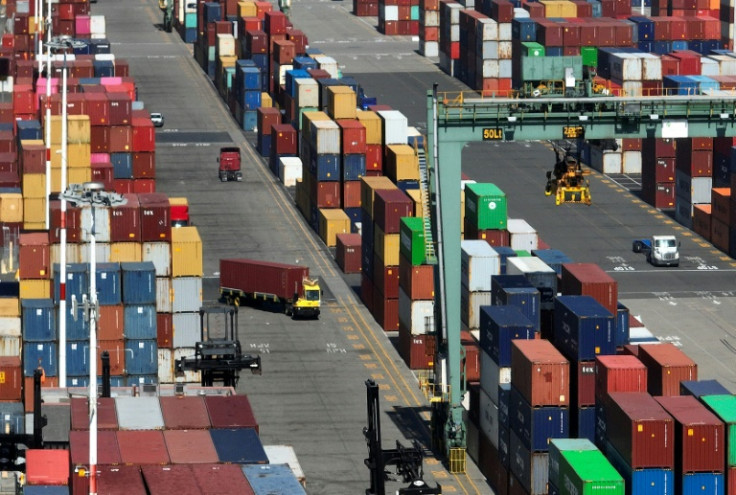
Mexico is gaining prominence as the top trading partner with the U.S., with bilateral trade reaching $200 billion in the first quarter of 2024, according to data from the Census Bureau.
As of March 2024, census data show that Mexico exported almost $120 billion to the U.S. and imported $80 billion.
Mexico has been the U.S.'s largest trading partner for 13 of the past 14 months, leaving Canada and China to vie for the second spot.
Earlier this year, the U.S. Department of Commerce released figures indicating that Mexican exports to the U.S. increased by nearly 5% from the previous year, reaching over $475 billion. Concurrently, Chinese imports to the U.S. dropped 20% to $427 billion, making Mexico the largest exporter to the U.S. for the first time in more than two decades.
Although Mexico's economy grew slightly in 2023, the Federal Reserve Bank of Dallas notes that many external factors have helped the country achieve the top spot among U.S. importers, namely the growing tensions between China and the U.S.
The relationship between China and the U.S. has steadily declined after the Trump administration imposed tariffs on imports in 2018, followed by Beijing's trade retaliation and military posturing.
Additionally, the lingering effects of the COVID-19 pandemic have continued to disrupt China's supply chains, prompting many manufacturers to relocate or nearshore their operations to Mexico. This shift became particularly attractive after the U.S., Canada, and Mexico signed the USMCA trade agreement in 2020, which streamlines the export of goods within North America.
Mexico's steady economic growth—and some luck—meant that Mexico benefited from favorable conditions in 2023.
Becoming the top trading partner of the world's biggest economy isn't a position that Mexico will want to relinquish anytime soon. However, to maintain a strong trade relationship, Mexican companies must enhance their operations to compete with developed manufacturing sectors like China's.
Eighty-nine percent of goods exported from Mexico to the U.S. are manufactured goods, followed by oil and agricultural products. What can manufacturers do to continue exporting at this rate? Some entrepreneurs argue that the key lies in tech investments and ongoing tax incentives.
The Mexican government issued a decree late last year, seeking to boost the nearshoring trend in 10 export-oriented manufacturing sectors, including electronic components, agribusiness, motors, and electronic equipment. The Ministry of Finance expects that the tax incentives will yield $18.5 billion in new investments throughout 2024.
Alex Sandoval, CEO of Allie, a Mexican AI startup servicing manufacturers, told The Latin Times that to meet the ongoing nearshoring demands, "Manufacturers will only be able to keep up with global standards by adopting technological advancements in their operations," —a practice with which Chinese companies are already quite comfortable.
"Traditionally, productivity in Latin America has been on the lower spectrum, and the only way Mexico can become equal to its foreign competitors is through delivering more output against existing resources. In today's manufacturing landscape, that can only happen through adopting technological innovations," he said.
To keep pace, small and medium-sized manufacturers might need to adopt the tech-enabled strategies of large Mexican multinationals. Many in the food and building materials sectors have already begun using AI to enhance their processes and lead the way. Grupo Bafar, a prominent Mexican food manufacturer, embraced AI over the past year, resulting in a performance boost of more than 15%.
Elias Picos, Head of Digitalization at Grupo Bafar, shared with The Latin Times their initial goal of employing AI to assess manufacturing performance, identify improvement opportunities, and minimize downtime. "We intend to get to the point where we become a 'smart factory' by harnessing a digital culture that takes us to new productivity levels," he said.
The technological skills gap represents another potential barrier for manufacturers. "If Mexican companies wish to continue their digital transformation, they must get the right talent to lead teams forward, and there's currently a massive talent gap," Sandoval said. "Upskilling and reskilling employees should be a top priority now, and the country must focus on offering higher education programs to produce more talent in the field."
According to a study by U.S. staffing firm ManpowerGroup, Mexico's tech talent shortage is expected to reach 79% this year, presenting a critical issue for the country's continued commercial success.
Another factor influencing Mexico's ability to attract more international companies is the absence of comprehensive ESG (environmental, social, and governance) strategies, particularly in achieving net-zero operations. Ana Paula Jiménez, Country Senior Partner at PwC Mexico, noted that only half of the companies surveyed in the region have integrated ESG into their business plans.
In the U.S., the National Association of Manufacturers released a 2022 report revealing that 58% of manufacturers consider sustainability essential for future competitiveness—a 20% increase from 2021.
As manufacturers strive for higher output, balancing productivity with sustainability is crucial. Active participation in the energy transition, moving from fossil fuels to renewable sources, is key. Mexican manufacturing boasts a long-standing tradition of delivering quality exports worldwide. Many of today's entrepreneurs hold the view that for Mexico to maintain its status as a leading trade partner, it is vital to adopt the latest technology, upskill the manufacturing workforce, and invest in sustainability throughout the production process.
© 2024 Latin Times. All rights reserved. Do not reproduce without permission.







